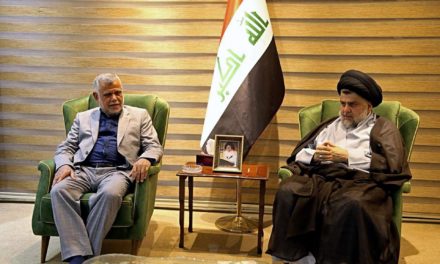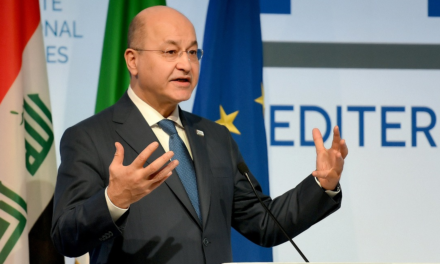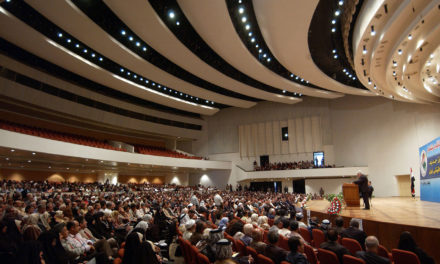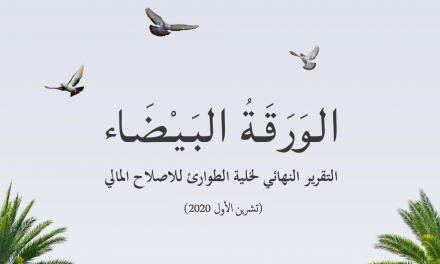Iraqi Security Forces Training (1st Joint Public Affairs Unit)
As street vendors and day labourers mixed in with hundreds of others making their rush hour journeys to work on a drab Monday morning in central Baghdad’s Al-Tayaran Square, two suicide bombers detonated themselves in quick succession. The vicious attack on the 15th of January not only marked the first major terror attack in Iraq’s capital city in 2018 but also the first significant act of terrorism in Baghdad in months. The death toll steadily rose to 38 with another 105 reported injuries as locals gathered at the site of the attack to help clear the debris and collect belongings off the bloodied ground to return to the victims’ families.
The Al-Tayaran Square bombings were a stark reminder that the Da’ish threat is alive, albeit not well. The game of whack-a-mole between Iraqi security services and Da’ish terror cells is now and, unless they regain significant territory, will continue to be the primary battlefield across the country. The dramatic drop in acts of terror across Iraq is telling of the extent of damage Da’ish incurred during the Iraqi resurgence and the effective job that Iraq’s intelligence apparatus is doing to foil terror attacks by Da’ish’s surviving cells.
The drawdown begins
A testament to these successes is the fact that just 3 weeks after the Al-Tayaran bombings, Iraqi government spokesman Saad Al-Hadithi announced yesterday that a drawdown of American forces in Iraq is underway. However, Al-Hadithi stressed the obvious, that this is not the start of a full withdrawal of U.S. forces. Associated Press reporters corroborated Al-Hadithi’s statements with western contractors based in Iraq, who said that dozens of troops had begun shipping out with their equipment from Iraq to Afghanistan.
Sources close to Iraq’s Prime Minister Al-Abadi told AP that the plan is 60% of American troops in the country will be withdrawn, leaving around 4,000 troops to continue training various units within the Iraqi military. The timing of this withdrawal has been linked to the upcoming May elections, with observers seeing this as a move to quell the fears of factions within the Iraqi political sphere over the presence of U.S. forces in the country.
This development comes on the back of rumours that American generals had offered to use their troops to help secure the election in May, something that was never confirmed by the Americans and that was promptly and overtly shut down last week by Al-Abadi’s spokesman who said in no uncertain terms that securing the upcoming elections was the responsibility of Iraq’s security services and nobody else.
The drawdown is a strong signal that both the Iraqis and Americans recognise that while the Da’ish threat persists, the group has been beaten thoroughly enough that combat readiness can be relaxed. Pentagon officials have also said there is no need for combat advisors and artillery units to remain in Iraq now that Da’ish has been militarily defeated.
The hunt continues
Meanwhile, the Iraqi armed forces have begun large-scale domestic security and Da’ish- focused operations over the last week. One such operation, which has been promised countrywide, concerns the confiscation of illegal weapons on Iraqi streets. The operation has seen early success in the capital, with security forces raiding homes and buildings suspected of housing illegal arms. Baghdad Operations Command has vowed to conduct extensive operations in every neighbourhood of the city.
The week has also witnessed a major offensive in western Iraq as security forces pushed from western Anbar towards the Saudi border in a bid to clean up Da’ish camps in the region. The operation has been a success with more than 50 dead terrorists and several camps, outposts and “guesthouses” (used to house militants before they set off on attacks) destroyed. Such operations will have to be carried out on a regular basis across the desert regions in northern and western Iraq in addition to the more agrarian landscapes of the east. Adopting these kind of pre-emptive strategies will not only prevent Da’ish from regrouping in rural Iraq but could also be seen as extending an olive branch to the Sunni communities who usually live in these areas and claim to have felt abandoned by the central government.
Protestors cut the Baqubah-Muqdadiyah road in Diyala province for several hours yesterday, demanding that security forces tackle the presence of Da’ish sleeper cells in the region which have recently been activated and have carried out multiple IED and gun attacks. While the Salahuddin and Diyala provinces have been relatively calm in recent months, the build-up of Da’ish cells and the ensuing low-level insurgency attacks must be a cause for concern for Diyala’s security apparatus. The central government in Baghdad must act to prevent Diyala and Salahuddin from becoming the terrorist strongholds they were in the not too-distant past.
Security operations in southern Ninawa province are regularly taking place and have proved to be very effective in combatting both the re-emergence of Da’ish terrorists who fled the recent battles and sleeper cells in the belt of districts south of Mosul. Just yesterday, Ninawa police units arrested Mazher Al-Jahishi, a senior Da’ish media official in Qayyarah while Iraqi forces managed to apprehend and kill 5 suicide bombers in a “guesthouse” in Hammam Al-‘Alil district during a security operation in the village of Beerhafi. The fact that these militants were stationed in a “guesthouse” indicates that they were planning an imminent terror attack.
The white flags of foreshadowing
The almost apocryphal saga of the White Flags might soon be coming to an end. The terror group reportedly made up of Kurdish jihadists, criminals and former Da’ish members which has been engaged in constant terror attacks against Iraqi security forces in Salahuddin and Kirkuk has been moved to the top of the agenda for security forces based in the region. Hashd (PMUs) units in addition to other branches of the Iraqi military and the Peshmerga have begun preparations to wipe out the White Flags. An agreement has been put in place that will see a coordinated assault from multiple locations launched soon to deal with the terror group that aims to secure oilfields in the area for the purpose of continuing the looting operations that stopped once Iraqi forces wrestled control of the fields from the Kurdish Regional Government.
The group also appears to be aiming to carve an escape path for Da’ish terrorists surrounded in the Himreen mountains near southern Kirkuk. Conflicting reports about the terror group’s size put its manpower at between 500 and 1,500 fighters, with the real number likely being somewhere in the middle. The group has mainly concentrated its attacks towards Tuz Khurmatu in Salahuddin province, with mortar attacks reportedly displacing thousands of civilians.
MP Hakim Al-Zamili, head of the Iraqi parliament’s security and defense committee, said on Tuesday that “separatist” entities are responsible for supporting the group and that security services have collected a large amount of intelligence about the group’s members, hideouts and collaborators. He added that a plan has been put in place to eliminate the terror group shortly.
The Turkish fire in Syria might spread to Iraq
The Turkish military kicked off the new month with heavy aerial bombardment of alleged PKK (Kurdistan Workers’ Party) positions in a string of villages near the Qandil Mountains in northern Iraq, apparently killing 50 Kurdish fighters. Turkish airstrikes in the region have become a regular occurrence over the last year but the Afrin conflict in Syria has intensified the Turkish retribution in Iraq. Iraqi Foreign Minister Ibrahim Al-Ja’afari clarified this week that Iraq rejects Turkey “interfering in the affairs of another country” and also reiterated the Iraqi rejection of Turkish troops’ presence in Bashiqah.
However, it was Turkish President Erdoğan’s comment last month about Turkey continuing its battle in Syria “until no terrorist is left until our border with Iraq” that was most disconcerting. Many Iraqis perceived the comment to mean that a Turkish Afrin-style attack might be on the cards in Iraq to dislodge the PKK’s presence in areas like Sinjar, near the Iraqi-Syrian border.
Such a development would almost definitely not have the blessing of Baghdad and would constitute a flagrant violation of Iraq’s sovereignty and could lead to Iraqi forces engaging Turkish troops in a similar fashion to the ongoing clashes between Syrian government troops and the Turkish military and its Salafi jihadist proxies in Syria’s Aleppo. Diplomacy between Iraq and Turkey has been strained in recent times but is generally heading in a positive direction, with a visit from Turkey’s Foreign Minister Mevlüt Çavuşoğlu last month promising an improvement in bilateral relations in “all fields”.

Haidar Sumeri
Haidar Sumeri is a Middle East observer, mainly focusing on Iraq’s war on terrorism.










